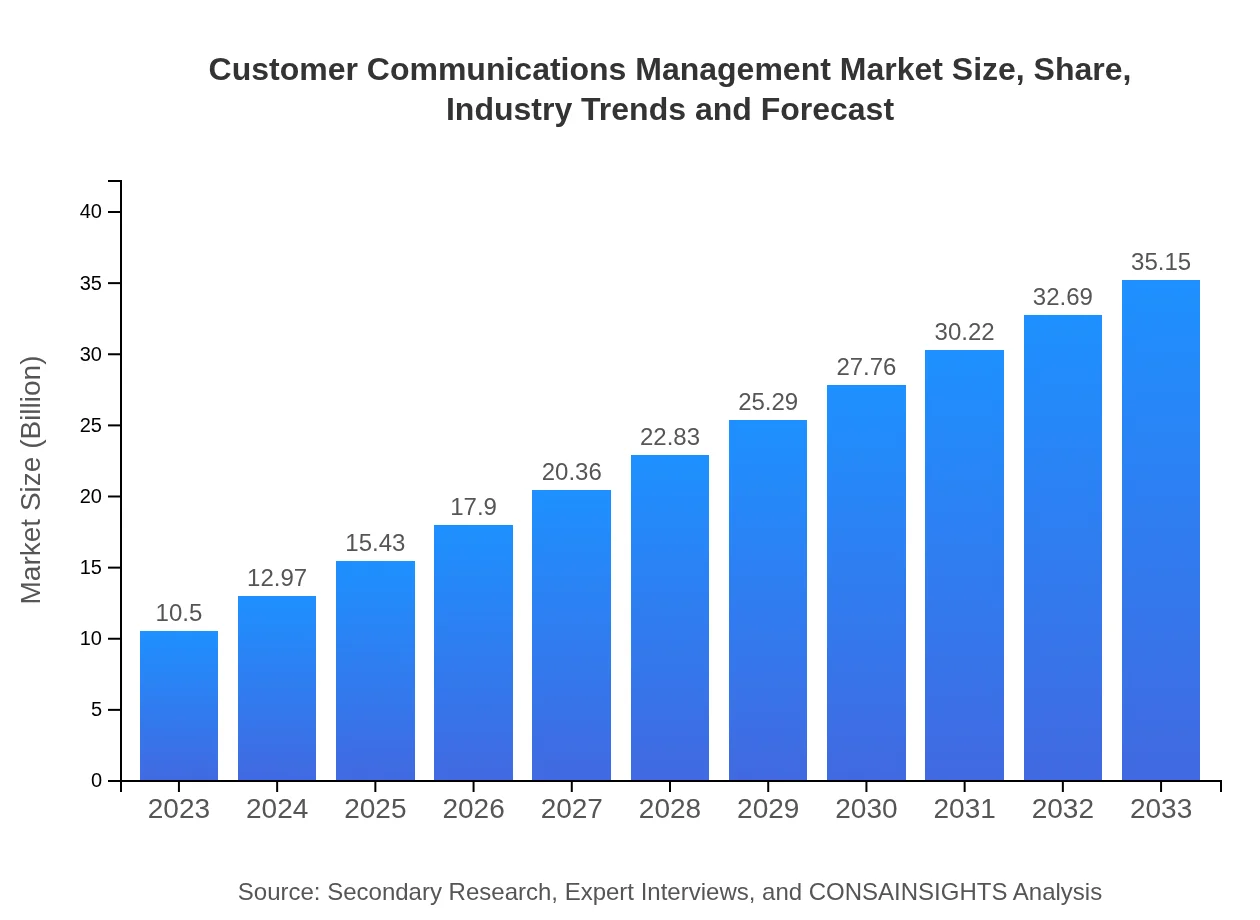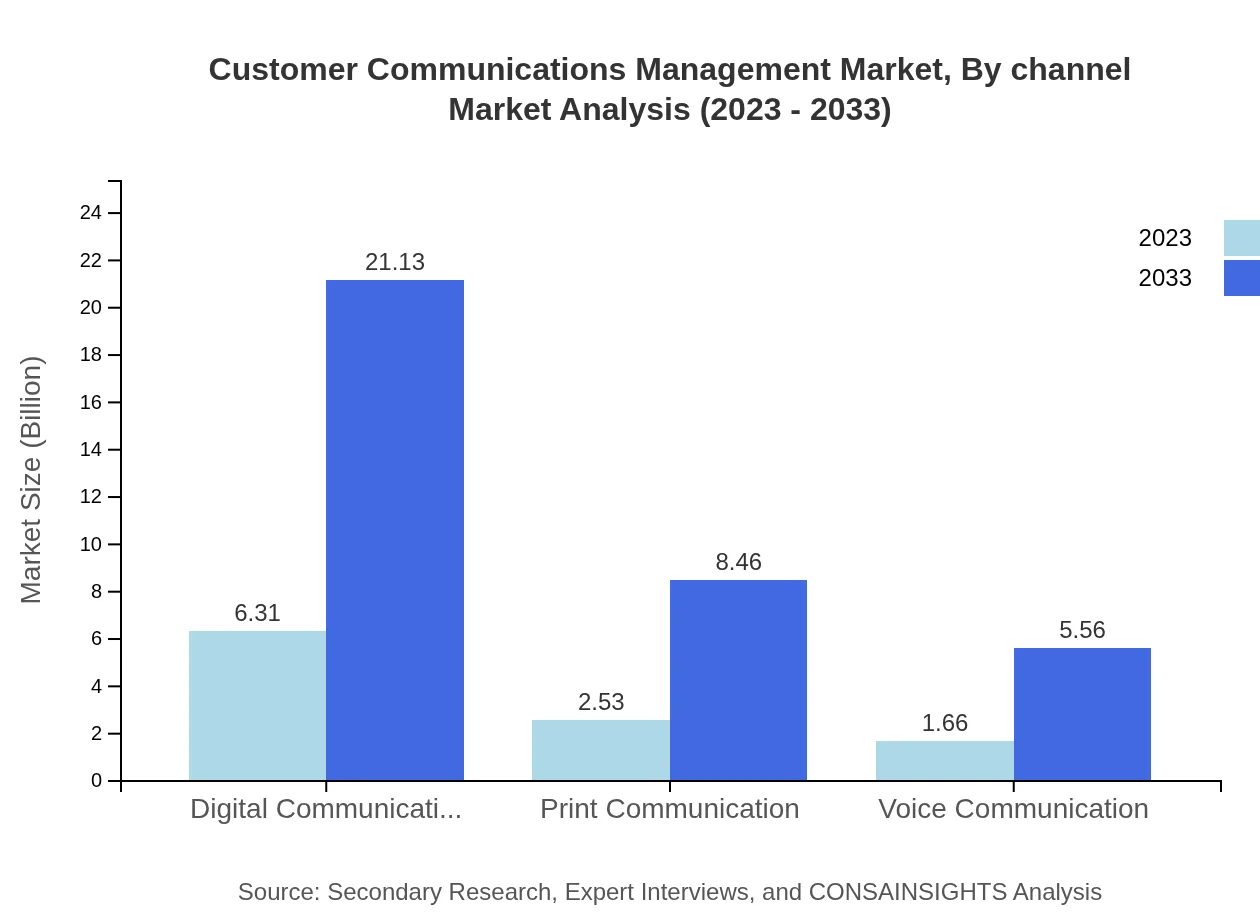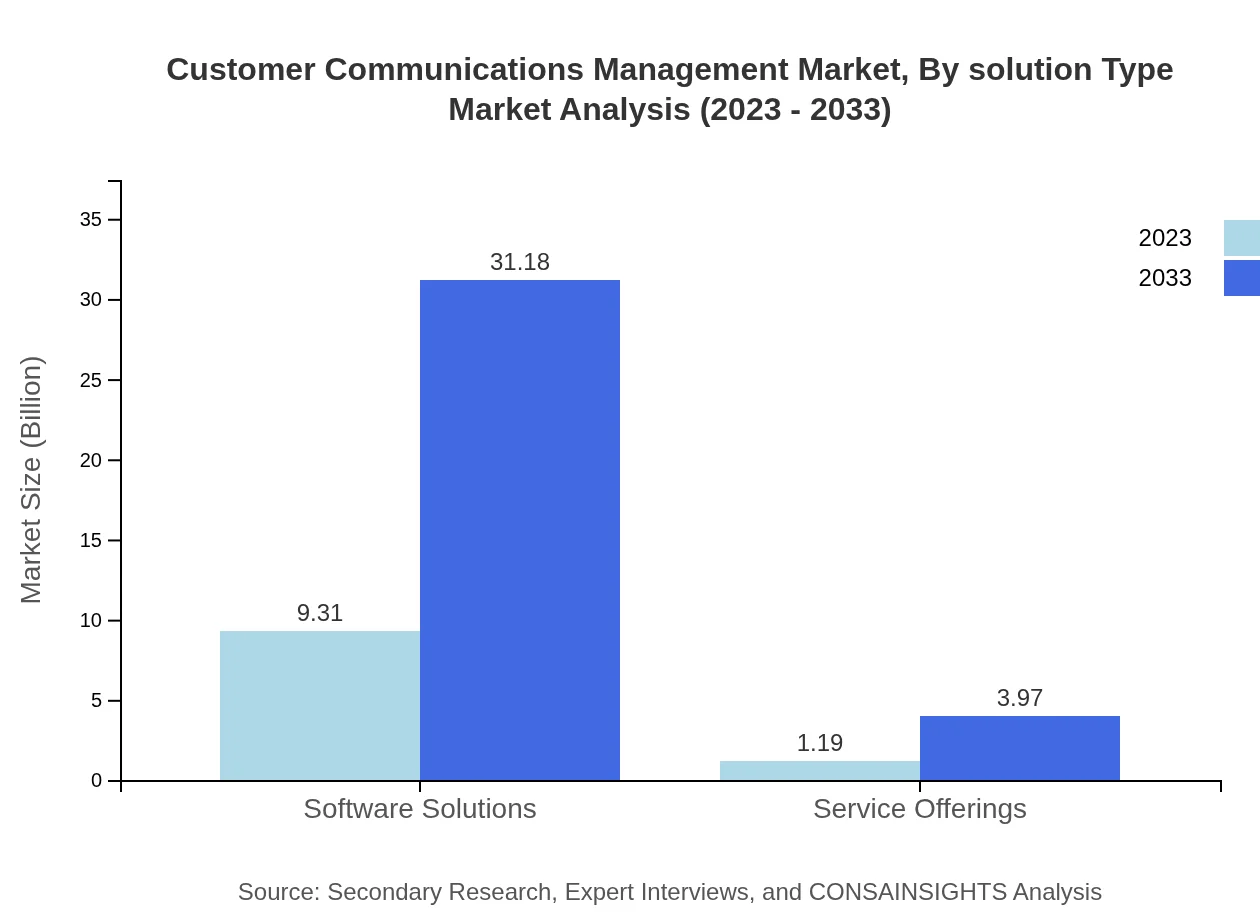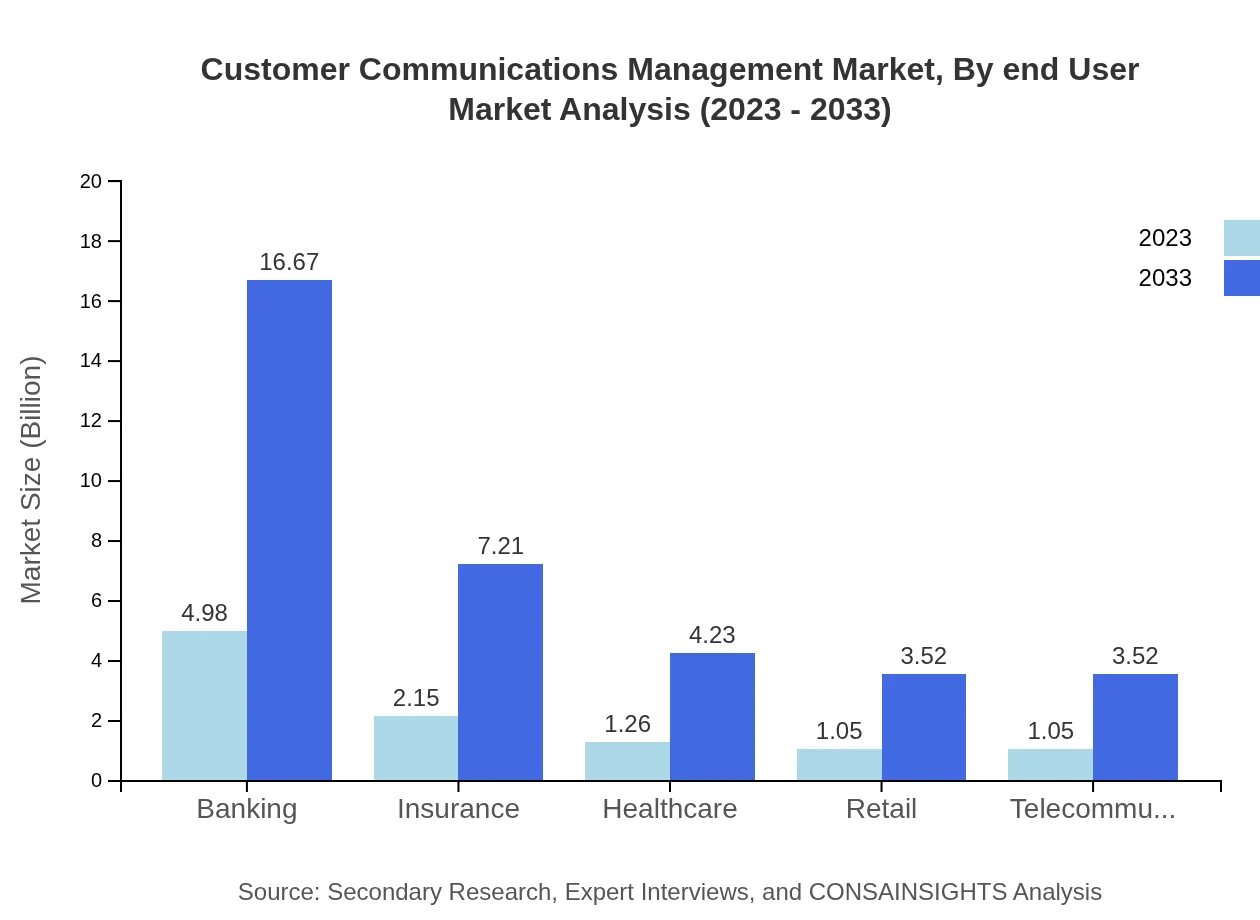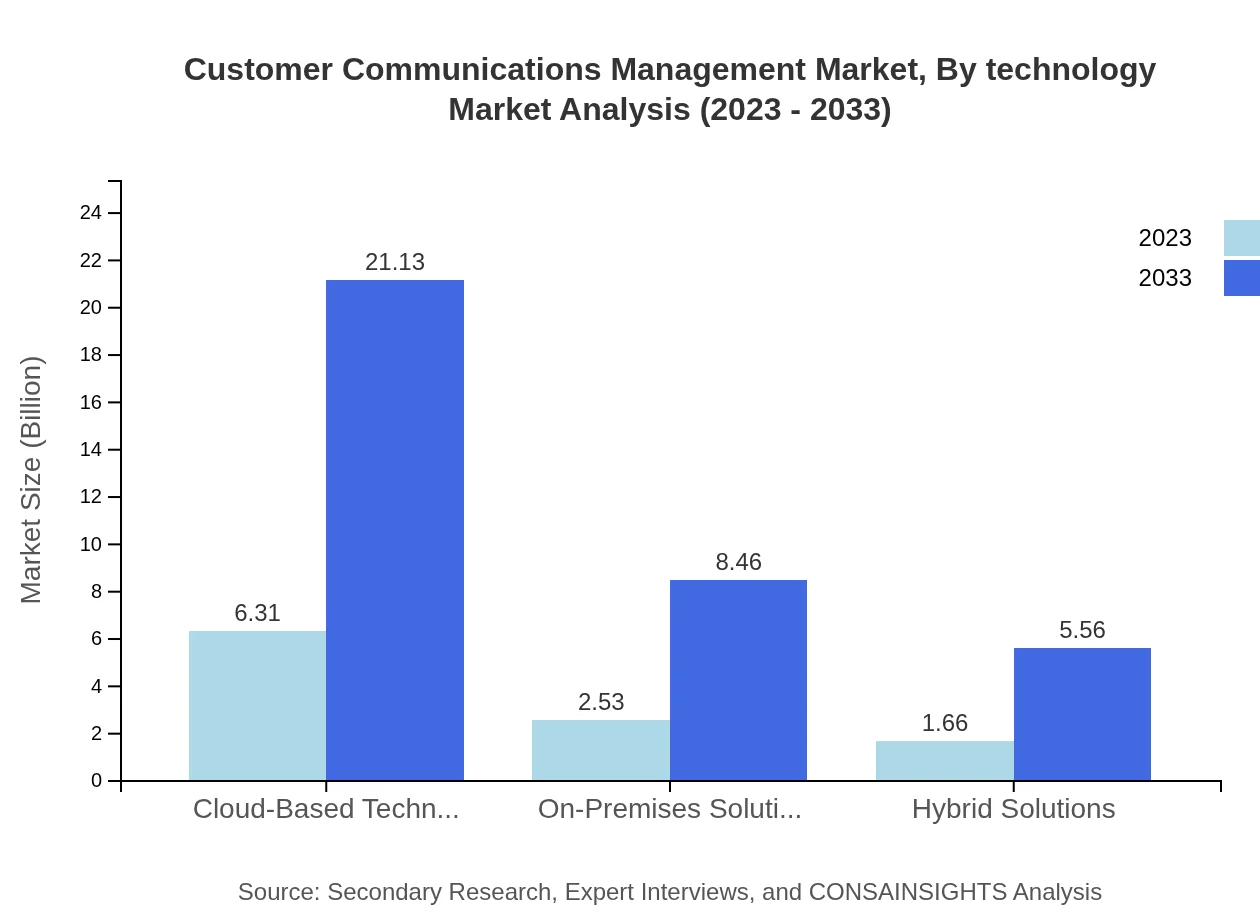Customer Communications Management Market Report
Published Date: 02 February 2026 | Report Code: customer-communications-management
Customer Communications Management Market Size, Share, Industry Trends and Forecast to 2033
This report provides comprehensive insights into the Customer Communications Management market from 2023 to 2033, including market size, segmentation, regional analysis, technology trends, and forecasts, aimed at helping stakeholders make informed decisions.
| Metric | Value |
|---|---|
| Study Period | 2023 - 2033 |
| 2023 Market Size | $10.50 Billion |
| CAGR (2023-2033) | 12.3% |
| 2033 Market Size | $35.15 Billion |
| Top Companies | Quadient, OpenText, Nice, Adobe, DocuWare |
| Last Modified Date | 02 February 2026 |
Customer Communications Management Market Overview
Customize Customer Communications Management Market Report market research report
- ✔ Get in-depth analysis of Customer Communications Management market size, growth, and forecasts.
- ✔ Understand Customer Communications Management's regional dynamics and industry-specific trends.
- ✔ Identify potential applications, end-user demand, and growth segments in Customer Communications Management
What is the Market Size & CAGR of the Customer Communications Management market in 2023?
Customer Communications Management Industry Analysis
Customer Communications Management Market Segmentation and Scope
Tell us your focus area and get a customized research report.
Customer Communications Management Market Analysis Report by Region
Europe Customer Communications Management Market Report:
Europe's market growth is also promising, with a valuation of $3.20 billion in 2023 expected to surge to $10.70 billion by 2033. Regulatory requirements and a stronger emphasis on data protection are propelling enterprises to implement effective CCM strategies.Asia Pacific Customer Communications Management Market Report:
In the Asia Pacific region, the market is projected to grow from $2.10 billion in 2023 to $7.04 billion by 2033, reflecting increasing digitalization and mobile penetration driving demand for innovative communication solutions.North America Customer Communications Management Market Report:
North America currently leads the market with an estimated size of $3.58 billion in 2023, anticipated to climb to $11.98 billion by 2033. Key drivers include the early adoption of advanced technologies and a mature digital communication landscape.South America Customer Communications Management Market Report:
The Latin American market is set to experience significant growth, rising from $0.80 billion in 2023 to $2.68 billion in 2033, largely due to expanding digital infrastructures and the growing focus on customer engagement strategies.Middle East & Africa Customer Communications Management Market Report:
The Middle East and Africa region shows modest growth, from $0.82 billion in 2023 to $2.74 billion in 2033, influenced by the evolving business landscape and greater emphasis on customer-centered communication.Tell us your focus area and get a customized research report.
Customer Communications Management Market Analysis By Channel
The digital communication channel dominates the Customer Communications Management segment, with a market size of $6.31 billion in 2023, expected to reach $21.13 billion in 2033, holding a 60.11% market share consistently across the forecast period. Print communication, although declining in usage, remains significant at $2.53 billion in 2023, with a projection of $8.46 billion by 2033. Voice communication, tied closely to customer service operations, stands at $1.66 billion in 2023, growing to $5.56 billion by 2033.
Customer Communications Management Market Analysis By Solution Type
Software solutions capture the bulk of the market, with an expected size of $9.31 billion in 2023, reaching $31.18 billion by 2033, embodying 88.7% of the share. Cloud-based technologies are increasingly favored due to scalability and cost efficiency, growing from $6.31 billion to $21.13 billion. On-premises solutions will remain relevant, citing a size increase from $2.53 billion to $8.46 billion, while service offerings are forecasted to grow from $1.19 billion to $3.97 billion.
Customer Communications Management Market Analysis By End User
Key sectors driving market growth include Banking, expected to spike from $4.98 billion in 2023 to $16.67 billion by 2033 with a market share of 47.42%, along with the Insurance and Healthcare industries, which will see their market sizes increase from $2.15 billion to $7.21 billion and from $1.26 billion to $4.23 billion, respectively. Retail and Telecommunications will maintain consistent growth patterns, each starting at $1.05 billion and anticipated to reach $3.52 billion by the end of the forecast period.
Customer Communications Management Market Analysis By Technology
Current technological trends within the Customer Communications Management sector emphasize cloud-based solutions, which compose a sizeable portion of the market. Innovations in artificial intelligence and real-time data processing capabilities are set to enhance customer interactions. New solutions leverage machine learning to predict customer preferences, enabling companies to create targeted communication strategies, while automation streamlines operational efficiencies.
Customer Communications Management Market Trends and Future Forecast
Tell us your focus area and get a customized research report.
Global Market Leaders and Top Companies in the Customer Communications Management Industry
Quadient:
Quadient specializes in CCM solutions, offering tools that enable companies to automate customer communications across digital and physical channels, significantly enhancing customer engagement.OpenText:
OpenText provides a suite of solutions designed to manage content and communications efficiently, focusing on enhancing user experiences through integrated digital solutions.Nice:
Nice develops sophisticated software for customer engagement focused on delivering real-time communication insights and optimizing customer interactions.Adobe:
Adobe’s Experience Cloud provides comprehensive CCM tools that allow businesses to create personalized customer communications, helping them optimize their outreach efforts.DocuWare:
DocuWare is known for its document management and CCM solutions that enable seamless customer communications and workflow automation.We're grateful to work with incredible clients.









FAQs
What is the market size of customer communications management?
The global Customer Communications Management market is projected to reach $10.5 billion in 2023, with a CAGR of 12.3% anticipated through to 2033. This growth indicates a strengthening demand for efficient customer communication solutions.
What are the key market players or companies in the customer communications management industry?
Key players in the customer communications management industry include prominent companies such as OpenText Corporation, Quadient, and Nice Ltd. These organizations are instrumental in providing innovative solutions that enhance customer engagement and streamline communication processes.
What are the primary factors driving the growth in the customer communications management industry?
Growth in this industry is primarily driven by the increasing demand for personalized communication, advancements in cloud-based technologies, and the escalating need for compliance and data security in customer interactions.
Which region is the fastest Growing in the customer communications management?
The Asia Pacific region is projected to be the fastest-growing area in the customer communications management market, expanding from $2.10 billion in 2023 to $7.04 billion by 2033. This reflects significant market potential in emerging economies.
Does ConsaInsights provide customized market report data for the customer communications management industry?
Yes, ConsaInsights offers customized market report data that can be tailored to specific requirements in the customer communications management industry, providing clients with the insights and analyses necessary for informed strategic decisions.
What deliverables can I expect from this customer communications management market research project?
Deliverables from the customer communications management market research project include detailed market analysis, segmentation reports, regional data insights, trend forecasts, and strategic recommendations based on current market dynamics.
What are the market trends of customer communications management?
Market trends indicate a shift towards digital communication channels, the rise of automation in customer interactions, and the growing integration of AI and machine learning technologies to enhance customer engagement capabilities.

